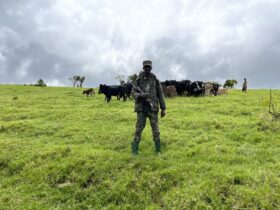‘Don’t let them fool ya, or even try to school ya! Oh no!
We’ve got a mind of our own, so go to hell if what you’re thinking isn’t right!’
– Bob Marley, Could you be loved.
On the closure of The Chronicles: The Chronicles frequently whitewashed Genocide ideologues and promoted unwarranted ethnic division and social tension. Such content sins against the preamble of the Rwandan constitution which defines what ‘We the people of Rwanda’ uphold as values, namely: ‘to fight division, to eradicate genocide ideology and seek solutions through dialogue and consensus.’ Negating those values isn’t freedom of any kind, it is ‘Umurengwe’: self-denial.
Colonialism has made it that some of us embrace foreign values, negate our own and unwittingly aspire to be people whom we are not. To appeal to international legitimacy, we have a predilection to undermine our societies by thinking, not from our history, our context and our aspirations, but from neo-colonial parameters.
Not all need to agree with the preamble of the Rwandan Constitution, but Rwandans have the duty to observe it. Rwandan newspapers must uphold Rwandan standards and foreign media emitting in Rwanda must not undermine them. This is a requirement in every country and in international law.
The International Covenant on Civil and Political Rights (ICCPR) which enshrines freedom of expression and of the media, stipulates that:
In Article I. ‘All peoples have the right of self-determination. By virtue of that right they freely determine their political status and freely pursue their economic, social and cultural development.’
While, Article XIX(1) ‘guarantees Everyone‘s right to hold opinions without interference.’,
The ICCPR insists in XIX(3) that: ‘The exercise of [that right] carries with it special duties and responsibilities and may therefore be subject to certain restrictions, including: (b) For the protection of national security or of public order (ordre public), or of public health or morals.’
This must not be confused with the right to dissent and criticize politicians and the government. Those things are protected by the law and are allowed. These restrictions are not arbitrary, they are necessary in a post-genocide context and they are well defined by Rwandan law. Breaking them in the name of freedom of media or expression is unprofessional and illegal.
When he published the infamous article on Ingabire’s parents, I wrote this to Fred Mwasa: ‘Whitewashing genocidaires and their ideology is a brand, like antisemitism, racism or misogyny. It is a line that a newspaper crosses once and possibly never walks back. I fear that while the Chronicles might be right again twice a day, like any broken clock, from now on I will struggle to view it any differently from BBC or Jambo news. In a quest to attract western diplomats’ sympathy and settle scores with some individuals in government, I am afraid you broke something. You committed an act of self-denial and lost your Rwandan Soul; Kayumba-the founder must be turning in his jail cell.’
While similar content led to the permanent closure of the Kinyarwanda channel of the British broadcaster, in this era of the internet the government needs not shut down toxic media anymore; consumers just stop subscribing to its toxicity and if not subsidized, the paper dies a premature death – as did The Chronicles in an anticipated announcement on Twitter, that they will be suspending publication. such a shame…
A shame because now that David Himbara seems to have retired, I thought Mwasa’s paper too needed to be frequently eviscerated and taught as a basket case in journalism and human rights schools. Alas! whenever he is released, I hope Dr. Kayumba works to redeem the image of his newspaper, terribly damaged by a nihilist.
Yesterday I spoke to Rwabigwi and young Mutsinzi was there. Luckily they listened to me. Mutsinzi is a brilliant young blogger who runs https://mellowviews.com. Unlike Rwabigwi’s https://www.kigalian.com and my https://gateteviews.rw, Mutsinzi’s is a true platform where many young people meet to express themselves; he is the future of blogging.
Two days before, Rwabigwi had tweeted praises of Classical-liberalism, I got upset and promised to have a word with him at Art Café, we did!
Rwabigwi is seduced by the freedoms offered by classical liberalism, but such freedoms I said to him, disempower the government to level the playing field and lift up the poor. It gives freedom to the strong to exploit the weak, and gives the weak freedom to sleep under the bridge in the cold.
In practice, Africa is shortchanged by Classical Liberalism. Inequality is at its paroxysm, wars of resources that fuel capitalism are never ending and the planet is polluted, at the brink of destruction in the pursuit of ever greater financial gains.
Proponents of classical liberalism did not consider the Africans way of life: the peoples’ rights, the Ubuntu and the Rwandan dialogue and consensus model of social organization.
With two other colleagues Dolph Banza and Davy a burundian, we spoke about our roles as social activists to advance our agenda as Rwandans, as Africans. We spoke about the importance of having our own platforms, especially seen in the context of the closure, days before, of the Chronicles. I explained that I am privileged for instance, to write for the New Times, for it expresses the Rwandan position, and the primary legitimacy and recognition that one needs is that of one’s own people. Others’ recognition is subsidiary.
Granted Rwanda isn’t a monolith and its people aren’t insular to mankind’s culture, science and technology. But Rwanda is a millennium civilization with tested values and principles which should serve as a vantage point from where we stand on the shoulders of Rwandans giants to express our agency through our various platforms on social media.
The dialogue continues, I promised to write for both Mellowviews.com and Thekigalian.com
As I left, that song kept playing on my mind..
‘Don’t let them change ya, Oh!
Or even rearrange ya! On No!
We’ve got a life to live.
Only the fittest of the fittest shall survive – Stay Alive! Eh!’ – Bob Marley, Could you be loved















Leave a Reply